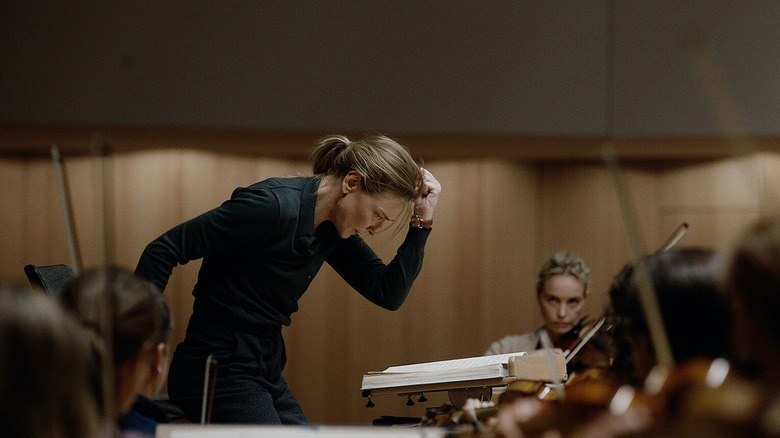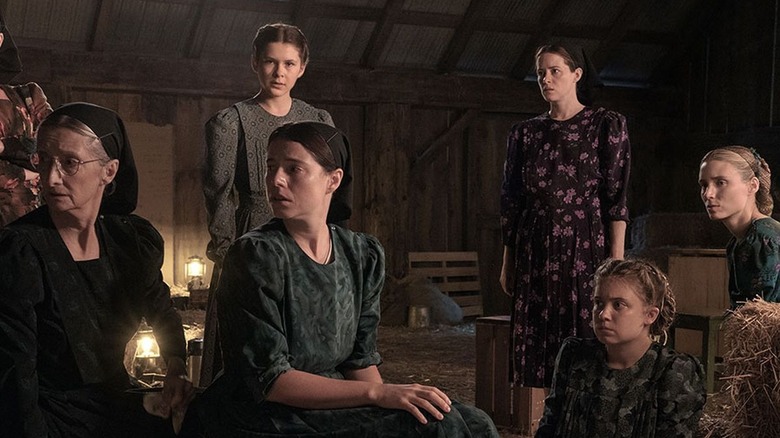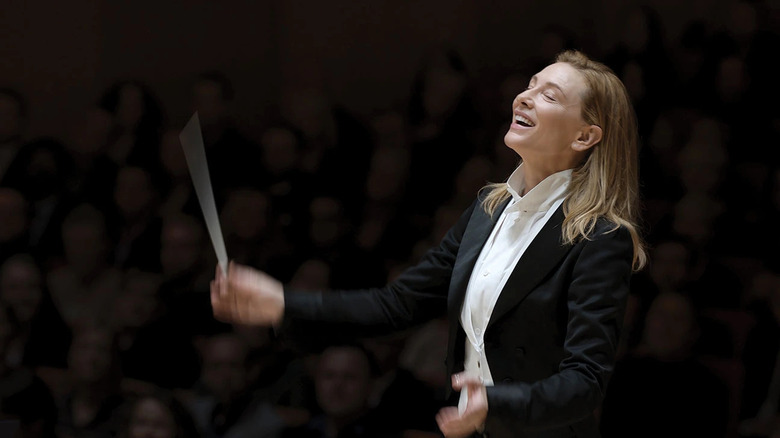
Everything changed when Harvey Weinstein was accused of dozens of counts of rape, sexual assault, and sexual abuse in 2017. It was the exposé that broke the dam, the moment that changed a viral movement into a part of our cultural and societal landscape. It was the event that made #MeToo more than a hashtag. And how was Hollywood to reckon with such an insidious thing as systemic sexual assault being part of its industry's fabric? By making movies about it, of course.
Sexual misconduct in Hollywood had long been an open secret. As long as there were men in positions of authority who had no qualms about using that power to victimize women, it would be. But the Me Too movement altered this dynamic completely, allowing Hollywood to come to terms with the systemic abuse built into the industry — in a way.
It's easy for self-reflective to slip into self-indulgent, and the Me Too movies that have emerged in the past few years have walked that line. Perhaps the first major and most misguided attempt at getting in on the Me Too zeitgeist was "Bombshell," the Nicole Kidman and Charlize Theron-starring drama about Fox News CEO Roger Ailes' sexual harassment scandal, which took an overly simplistic approach to a subject that most people in real life hadn't even come to terms with. But the Me Too movie hit its apex in 2020, with movies such as "The Assistant," "Promising Young Woman," and "Never Rarely Sometimes Always" reckoning with the different aspects of Me Too with dread, guilt, vengeance, and an all-too-familiar acknowledgement of its realities. Me Too even made its way into TV, with shows like "Big Little Lies" and "I May Destroy You" grappling with sexual assault with increasing complexity.
So when film and TV seem to have explored nearly every avenue of depicting Me Too on the screen, what's next? Three films that played at the 2022 New York Film Festival may have the answer.
Women Talking Lets Women Talk

"What follows is an act of female imagination," reads the title card for Sarah Polley's searing and clear-eyed drama "Women Talking."
Based on Miriam Toews's 2018 novel of the same name, "Women Talking" takes place in a fictional religious community in 2010 but is inspired by the real mass rape of the women in an ultraconservative Mennonite community in Bolivia. Instead of lingering on the horrors of the acts — which include young women and girls being drugged and raped periodically while they slept — "Women Talking" chooses instead to focus on the aftermath, when the men have been arrested and the women have gathered to decide what to do next. After taking a vote, they narrow down the options to "leave" and "stay and fight." A group of women are selected to debate which option to take.
It's incredible how much "Women Talking" lives up to its title in every way, yet still manages to be a riveting watch. With these kind of dialogue-heavy, single-location films, there's the concern of becoming too stage-y, but "Women Talking" overcomes that hurdle with the sheer power of the raw emotions of its titular women, played to perfection by Rooney Mara, Claire Foy, Jessie Buckley, Judith Ivey, Frances McDormand, Sheila McCarthy, and more. They feel betrayed, unsafe in their own homes, unsafe in their own beds. Their bodies and their daughters' bodies brutalized by the very men who were supposed to keep them safe. And they're angry.
The anger sometimes comes out in violent bursts, like when Foy's Salome attacks the men with a scythe with a vengeful hysteria that borders on possession, but most of it appears as a barely repressed simmering rage, in the women's clenched jaws and tight fists as they discuss the wrongs that have been done to them, and what they must do in its aftermath.
"Women Talking" finds power in that aftermath. Where sexual assault often renders women victims, defined by the humiliation and the violence done against them, Polley's film gives its women their voice back. It's a Me Too movie that is sparked by that violence, but not swallowed whole by it. With "Women Talking," there's more to sexual assault than victimhood.
She Said Looks At The Recent Past

If there's one "Me Too" movie this year that can be called frustratingly conventional, it's "She Said." Directed by Maria Schrader from a screenplay written by Rebecca Lenkiewicz, "She Said" dramatizes the reporting of the exposé that would kick off Harvey Weinstein's downfall, leading to his arrest and conviction for multiple counts of rape and sexual assault. But one big question looms over the entirety of the film: is it too soon for a Harvey Weinstein movie?
"She Said" lets a little more time pass between the events it's adapting compared to, say, "Bombshell," but it does still feel a little too soon, and as a result, a little too self-aware. Hollywood loves a movie about Hollywood almost as much as it loves a good old-fashioned journalism movie, and that love seeps into "She Said," which verges on self-congratulatory — an odd place to be when Weinstein has only been in prison for two years, and when abusers still run rampant in the industry. There are a few too many Me Too buzz words thrown in at the beginning of the film, a few too many knowing remarks about the patriarchy, a few too many print-outs of blown-up tweets. The journalists at the center of the are intrepid and noble, and the villains are hulking men with too much power and no qualms about using it to destroy others. Like many a Hollywood movie, it simplifies a complicated, harrowing, still-too-close story into an easy-to-digest tale.
But there's also an element of the deeply personal that adds an interesting wrinkle to "She Said," even if it doesn't quite work. The choice of having Ashley Judd, one of the first of Weinstein's prominent victims to publicly go on the record, play herself in the film was clearly intended as a therapeutic exercise, even if it could sometimes feel slightly self-aggrandizing. But its in these messy corners that "She Said" is the most interesting, as Hollywood attempts to come to terms with one of its greatest sins.
Tár Is The Best Me Too Movie Of The Year

Surprisingly, the best Me Too movie of the year isn't even based in reality, nor is it about a male abuser. Instead, it's about Cate Blanchett's fictional composer Lydia Tár, and her tragic, near-mythic fall from grace.
Written and directed by Todd Field, "Tár" is ostensibly a "cancel culture" movie, but it's so much more than a pithy commentary on the phenomenon taking over our current cultural landscape. It's as much a Greek tragedy as it is a modern psychological drama about a woman in power who lets that power get to her head.
Lydia Tár is a genius, celebrated as a titan of the classical music industry — which in this world, is as big as movies or literature, just go with it — a composer, conductor, EGOT winner who is on top of the world. Until her own blind ambition and ego sends her crashing down. A damning video taken during a heated lecture that sends a student storming out. A suicide of a past protégé who Lydia had carelessly treated and thrown away. A weakness for mixing her professional and romantic pursuits. "Tár" unfolds like an intimate character study before you slowly realize that it is about a timely hot button issue, and by that time, you're too engrossed in a character who has become the kind of villain that other movies make monsters out of.
"Tár" forces you to sit with that sense of queasy sympathy, but lets you celebrate the schadenfreude of seeing an arrogant titan crumble. It's an unusual, inspired approach to cancel culture, in that the "cancel culture" itself feels almost secondary to its story. The power of "Tár" comes from the fact that we've seen this story before — that great, mythic downfall — and yet we've never seen it so elegantly and deftly made timely. With "Tár," "cancel culture" is just the latest name we've given to a timeless tale of ego and self-destruction.
Read this next: The Best Movies Of 2022 So Far
The post How Tar, Women Talking, and More Helped the Me Too Movie Evolve in 2022 appeared first on /Film.
0 Comments